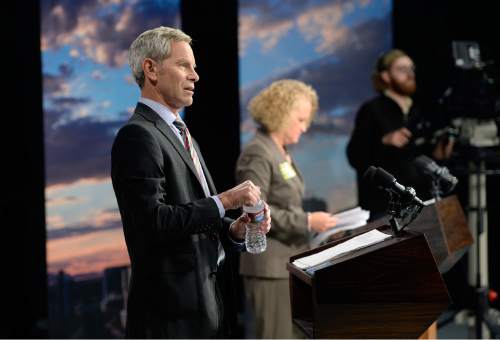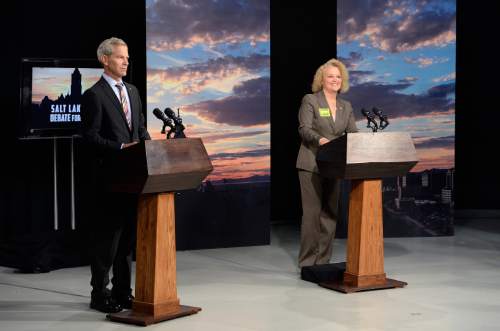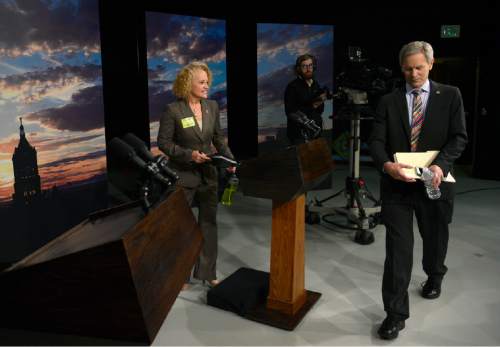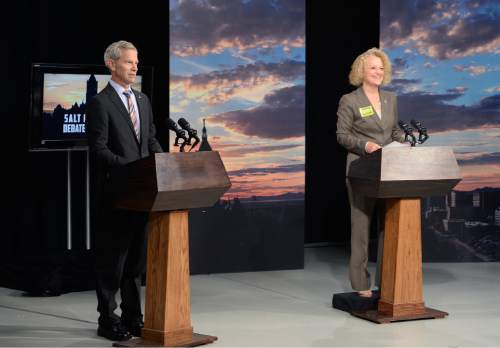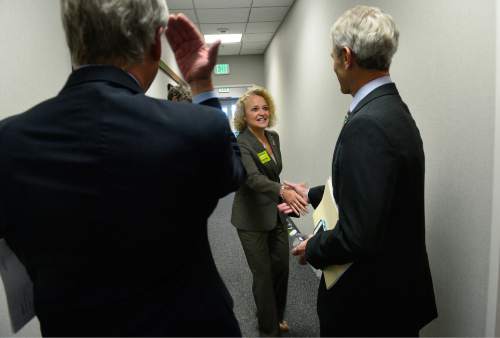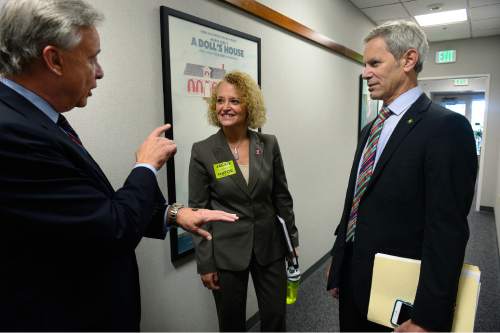This is an archived article that was published on sltrib.com in 2015, and information in the article may be outdated. It is provided only for personal research purposes and may not be reprinted.
Keep Salt Lake City's momentum moving forward — or it's time for change in the mayor's office.
Those dueling themes were rolled out in various ways Thursday as KUED hosted a debate between Mayor Ralph Becker and challenger Jackie Biskupski.
The debate aired Thursday night.
Becker is seeking a rare third term. Biskupski served 12 years in the Legislature and was Utah's first openly gay lawmaker.
The pair sparred on public safety, homelessness, transportation, the economy and other issues.
In the aftermath of a crackdown on crime around Pioneer Park two years ago, residents in other areas of the city began to complain about a lack of police presence in their neighborhoods, along with long response times when reporting property crimes.
Becker said a new program launched recently by acting police Chief Mike Brown, along with eight new bike-patrol officers budgeted by the City Council, already is showing positive results.
"We have seen a remarkable change," he said.
But Biskupski said Salt Lake City police must be more collaborative with other law-enforcement agencies, most notably Unified Police Department, to get to the root of drug trafficking and associated crime around The Road Home shelter. For the past eight years, she has worked for Salt Lake County Sheriff Jim Winder, who oversees the UPD.
Biskupski added that the police effort downtown has chased crime into other areas, such as Fairmont Park in Sugar House.
When it comes to business and the economy, the mayor asked the audience to recall the Great Recession when he took office. Now, he said, Salt Lake City is cited by a Gallup poll as the No. 1 city for job creation. Becker said he has streamlined city government policies and procedures to make it more business friendly.
"We are in a growth spurt," the mayor said, "that's never been seen before in this city."
By contrast, Biskupski said the capital is not landing its share of new businesses. Many high-tech companies have located in other cities along the Wasatch Front. She would collaborate with the colleges and universities in Salt Lake City to incubate new businesses and mentor them to success.
Not least, she dinged Becker for his confusing parking meters and their two-hour limits.
"What I hear from our seniors is the meters are too difficult," she said, "and so they don't come downtown anymore."
The mayor, however, said the blue kiosks are a success and that a poll showed most people like them.
Homelessness impacts public safety as well as businesses. Becker said his commission on homeless-service providers and facilities, coupled with a parallel effort by Salt Lake County that is analyzing the efficiency of homeless services and programs, will yield important answers by year's end. He said he would support whatever recommendations they provide.
Biskupski, however, said that moving the present facilities would be too expensive when the money for such a relocation could go to short-term solutions to get homeless families back in housing. And, she said, Salt Lake City should not bear the entire financial burden of what is a statewide problem.
"There is a tragedy going on. ... We have created an unacceptable environment," she said of the Rio Grande area. "But it's not just a Salt Lake City issue. It should not rest solely on the shoulders of Salt Lake City residents."
Both candidates favor Proposition 1, the one-fourth-cent sales tax increase for transportation. Of those revenues, 40 percent would go to the Utah Transit Authority, 40 percent would go to cities and 20 percent would go to counties.
Becker said his "Complete Streets" program, which allows for pedestrians, bicycles and autos, has led to great transportation improvements in the city. New transit-tax revenues could continue that effort, he said.
Like Becker, Biskupski said more bikes and buses would be a good thing. But she noted that Becker's transportation initiatives have not improved air quality. She would partner with big business and other municipalities to make a regional push for clean air through the Utah Legislature.
The two also will square off Oct. 28 at 7 p.m. in a debate sponsored by The Salt Lake Tribune at the Salt Lake City Library, 210 E. 400 South.
Mail-in ballots are arriving at Salt Lake City households this week. To be valid, they must be postmarked no later than Nov. 2. Election Day is Nov. 3.


